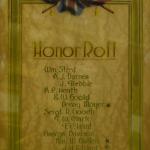BX September 4, 1918
Mr. John Trebble, 26 Park Avenue East, received word yesterday that his son, Private James Thomas Trebble, who went overseas with the 36th Battalion, was officially reported admitted to the 47th Casualty clearing station, August 22 with gunshot wounds. He received wounds in both arms and injuries in the back.
BX September 28, 1918
Word has been received by Mr. J. Trebble, 26 Park Ave., E., that his son, Private James Thomas Trebble has lost his right arm through being wounded by pieces of shell on Aug. 22. He was also wounded badly in the back and left arm and is in very helpless condition.
BX February 15, 1919
With Arm Off, Leg Crippled, Still Cheerful – Pte. James Thomas Trebble, Park Avenue, Interviewed on Reaching Portland – “Far from Dead Yet”
Special to The Expositor
PORTLAND, Me., Feb. 14 – For the first time the people of Portland, who went to the Grand Trunk docks during Thursday afternoon to meet the incoming British hospital ship, the Royal Mail Liner Aragay, saw the real horror of war in all their apparent hideousness. The steamer arrived at quarantine shortly after 3 o’clock and was boarded there by the chief immigration inspector at this port, Dr. Albert F. Stuart of the U.S. Marine Hospital Service and Charles W. Skilling’s, customs boarding officer. Everything on board being found all right, the steamer proceeded slowly to her berth at the No. 4 Grand Trunk dock, presenting a very remarkable sight as she neared the wharf, the soldiers on deck waving and cheering in answer to the hearty welcome given them.
One of the largest crowds ever seen on the Grand Trunk wharf gathered to witness the docking. There were many men who had one eye out and a few who had lost both eyes, but they, like the rest were cheerful. One blind man said he had begun to learn to run a typewriter by touch and felt that he could do a lot of work as his sister could read to him, and they could between them do a good bit of public stenography. There are some poor fellows who are under restraint by reason of losses of their reason through shell shock dementia called recurrent mania, which means that at times they are in a semi-comatose condition. About 20 of the cases will have to be left here for the time being, until they are in good shape to travel by rail. But out of almost 775, this is not too heavy a percentage.
The officers were most emphatic in denying the story that some men had died on the way over, “the men who went on board the ship at Liverpool are all on board of her now and every one of them is better than he was when he started,” said one of the medical staff.
Accompanied by a Red Cross nurse the newspaper correspondent representing The Expositor walked up the gang plank receiving a welcome here and there. Upon reaching the deck and calling “Brantford, Ontario,” the correspondent turned to answer the reply at his right. Calmly sitting on the rail, a pleasant smile of welcome lighting his features, sat a youth of not more than 17 years of age, Private J. Trebble of 26 Park Avenue, Brantford, one arm missing and one leg suffering from gunshot wounds. “I am from Brantford,” greeted Trebble, and the kind-hearted Red Cross girl started to sympathize with him. “Now, don’t you cry over the young lady, I am far from a dead man yet. I don’t look very bad, do I?” The correspondent remarked that none of the men on deck appear to be very ill, “that’s on account of the good sisters and the orderlies,” was the reply. “They cannot do enough for you. These fellows may not have gone through hell, as some of us did, but they are doing just as our mothers would do, and you know what I mean by that.”
Private Trebble would have but little to say regarding the loss of his arm. “I was just going along with the boys when a bit of shell took me and I went off to sleep. I dreamed that I was being cut up with red hot knives and that they were running through my arm, and when I woke up I found myself in a hospital in a place I never heard of before, while I was alive and on duty, with my arm amputated and nobody around to tell me how I got mine, I have always thought that some sniper got me in range and shot lengthwise of the arm, up through my elbow. At any rate I should worry.


